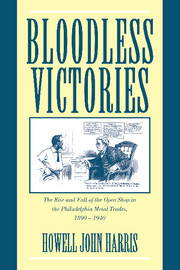Book contents
- Frontmatter
- Contents
- Figures and Tables
- Acknowledgments
- Abbreviations
- 1 Introduction
- 2 The Iron Masters
- 3 Laying the Foundations: Peace and War in the Metal Trades, c. 1890–1904
- 4 Combat, Crisis, and Consolidation, 1904–1915
- 5 “The Largest, Strongest, and Most Valuable Association of Metal Manufacturers in Any City”
- 6 Riding the Storm, 1915–1918
- 7 The War After the War, 1918–1923
- 8 Pacific Passage: Quaker Employers and Welfare Capitalism, c. 1905–1924
- 9 A Liberal Interlude: The Modernization of the MMA, c. 1924–1931
- 10 The Deluge: The Great Depression and the End of the Open Shop
- 11 The New World: Accommodation and Adjustment, 1936–1939
- 12 Afterword: “We'll Still Be There. We're Not Going Away”
- Appendix: Databases Referred to in Text: Nature, Sources, Use
- Index
6 - Riding the Storm, 1915–1918
Published online by Cambridge University Press: 21 September 2009
- Frontmatter
- Contents
- Figures and Tables
- Acknowledgments
- Abbreviations
- 1 Introduction
- 2 The Iron Masters
- 3 Laying the Foundations: Peace and War in the Metal Trades, c. 1890–1904
- 4 Combat, Crisis, and Consolidation, 1904–1915
- 5 “The Largest, Strongest, and Most Valuable Association of Metal Manufacturers in Any City”
- 6 Riding the Storm, 1915–1918
- 7 The War After the War, 1918–1923
- 8 Pacific Passage: Quaker Employers and Welfare Capitalism, c. 1905–1924
- 9 A Liberal Interlude: The Modernization of the MMA, c. 1924–1931
- 10 The Deluge: The Great Depression and the End of the Open Shop
- 11 The New World: Accommodation and Adjustment, 1936–1939
- 12 Afterword: “We'll Still Be There. We're Not Going Away”
- Appendix: Databases Referred to in Text: Nature, Sources, Use
- Index
Summary
The campaign to establish and maintain the Open Shop, in Philadelphia as in the rest of industrial America before the war, had been aided by recurrent periods of very high unemployment, and scarcely impeded by state intervention. Entrepreneurial liberty rested on sound foundations: Competition between firms for workers' services was rarely unmanageable; governmental involvement in the private relations of employers and employees was only occasional, and normally quite supportive – law-enforcement stiffened with the occasional injunction.
But as 1905–07 and 1910–11 illustrated, a tight labor market made the Open Shop somewhat more vulnerable. During cyclical upswings makers of producers' goods, in particular, experienced short-run but severe demand pressures that sharply increased the bargaining power of their skilled workers, the supply of whom was quite inelastic. And the political equilibrium of the Republican era was under strain in the prewar years. “Progressivism” infected the elected portions of city, state, and national governments, and threatened to increase the forces all three brought to bear limiting employers' freedom to manage.
So the foundations of the Open Shop were not, perhaps, quite as solid as they at first seemed. Workers were numerous, had votes, and had middleclass sympathizers; their unions had political options open to them providing a new forum within which to pursue the goals of industrial struggle even after meeting defeat on the picket line and shop floor. And prosperity, one day, must surely return, with its attendant organizing drives and strikes.
Because of these possibilities, insecurity pervaded the MMA's membership in the early ‘teens, providing ever-present and growing reasons for collective self-defense.
- Type
- Chapter
- Information
- Bloodless VictoriesThe Rise and Fall of the Open Shop in the Philadelphia Metal Trades, 1890–1940, pp. 198 - 248Publisher: Cambridge University PressPrint publication year: 2000



